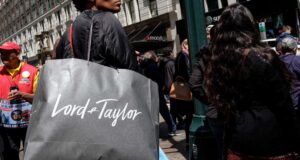Fashion executives looking ahead to the new year, have little to be certain about except how uncertain the next 12 months are likely to be.
The industry was already grappling with a volatile mix of economic and geopolitical challenges, but America’s re-election of Donald Trump earlier this month has added a new dimension of unpredictability to the outlook.
The President-elect has made sweeping commitments to overhaul America’s trade relationships, free businesses from regulatory red tape, reduce taxes and curb illegal immigration. Investors, analysts and business leaders have spent the last few weeks parsing his statements and government appointments to assess how political rhetoric will translate into policy and how Trump’s return to power will shape the market.
This week, the fashion world got a few clues on three key issues
Tariff Targets
Throughout his campaign, Trump threatened to impose aggressive tariffs on all foreign goods entering the US, but on Monday he provided some more specifics on imports from America’s largest trade partners: Canada, Mexico and China.
In social media posts, the President elect said he would levy a 25 percent duty on imports from Canada and Mexico and threatened an additional 10 percent tariff on goods from China (far lower than the 60 percent tariff on Chinese-made products that he had previously threatened).
Many fashion businesses have been rethinking sourcing strategies in preparation for such moves for months. Still, China remains America’s biggest clothing supplier. Meanwhile Mexico, a far smaller manufacturing hub, still ranks among the top five suppliers to the US. Fashion brands would likely pass on the cost of new tariffs to American consumers, but that could weigh on consumer spending. US brands could also face retaliatory duties that make it harder to access key foreign markets: the two largest export destinations for American apparel and textiles are Mexico and Canada.
Shares in Canadian fashion companies Canada Goose and Lululemon briefly dipped on Monday.
“We do not comment on speculation,” Canada Goose said in a statement. “What we’re focused on right now, during one of the busiest shopping weekends of our peak season, is driving our business, delighting our customers and delivering unparalleled product.”
Analysts have read Trump’s statement in two ways. Some have taken the increasing specificity of tariff plans at face value, anticipating swift and early action once the President-elect takes office. Others have pointed to previous patterns, where blustery social media blasts have served as more of a negotiating tactic than anything else.
DEI Reversal
This week, Walmart became the latest and largest US retailer to scale back its diversity, equity and inclusion programmes.
The company is making sweeping changes that include discontinuing priority treatment for suppliers based on race or gender and removing certain transgender products from its online marketplace. It won’t renew a five-year commitment to fund the Center for Racial Equity, a nonprofit it established in 2020 to address systemic racism; and it’s withdrawing from the Human Rights Campaign Corporate Equality Index, a benchmark measuring LGBTQ workplace policies.
“We’ve been on a journey and know we aren’t perfect, but every decision comes from a place of wanting to foster a sense of belonging,” Walmart said in a statement shared with media. “We are willing to change alongside our associates and customers who represent all of America.”
Many brands began quietly rolling back or deprioritising DEI efforts as attention on Black Lives Matter faded in 2021. The trend has been compounded by a Supreme Court decision to end affirmative action at universities in 2023 that amped up concerns DEI programmes could make companies the target of lawsuits. Walmart’s move comes as Trump’s re-election has emboldened conservative advocates in their campaign against so-called “woke capitalism.”
“This is Walmart preparing for a Trump presidency and Justice Department,” the co-founder of DEI consultancy Peoplism Amber Madison told The New York Times this week. “If Walmart’s assessment of the Trump administration is that it will protect his friends and go after its enemies, this is Walmart showing they’re a friend.”
On the other hand, Trump’s rhetoric on immigration, women’s, and LGBTQ rights could spark a resurgence of DEI-related flash points over the next four years, some experts say. If a moment as galvanizing as the so-called “Muslim ban” Trump introduced weeks after taking office in 2016 were to reoccur, many brands may find themselves unprepared, with little to show for efforts to support the diverse populations that comprise their consumer base.
Consumer Confidence
One of the many unknowns is how consumers will react to the re-election of Trump, who is expected to cut taxes, putting more money in the pockets of shoppers.
What better way to test that than America’s biggest shopping holiday: Black Friday.
Retailers started promoting steep discounts well ahead of the big sales day in an effort to lure in cautious and increasingly budget consumers. It seems to be working. Online shoppers spent $100 billion online so far this month and $6 billion on Thanksgiving alone, up nearly 10 percent from a year earlier, according to Adobe Analytics.
The National Retail Federation is forecasting holiday spending will reach a record high of close to $990 billion this year, growing as much as 3.5 percent compared to 2023. US consumer confidence hit its highest in more than a year this month.
Still, shoppers remain highly sensitive to prices — a key factor in this year’s US election — and on the lookout for deals. Anecdotally, some businesses and consumers are boosting spending now in anticipation of trade-war-related price hikes in the year ahead.
THE NEWS IN BRIEF
FASHION, BUSINESS AND THE ECONOMY

LVMH’s Bernard Arnault tells spy trial he didn’t know about surveillance. One of France’s former intelligence chiefs is accused of violating privacy laws while helping the world’s largest luxury group fight counterfeits and monitor left-wing activists.
Abercrombie & Fitch sales fall short of Wall Street expectations. The retailer reported record net sales of $1.2 billion, but saw its shares decline as growth fell short of investor expectations, despite an increase in its full-year outlook and strong same-store sales.
Urban Outfitters defies retail woes on Anthropologie sales gains. The results suggest the company is faring better than other apparel retailers that are vying to attract increasingly budget-conscious consumers into their stores.
Nordstrom bumps up annual outlook, sidestepping retail weakness. The Seattle-based department-store chain is forecasting that annual sales, including credit-card revenues, will be flat to up 1 percent versus last year.
Macy’s delays results after finding employee hid millions in delivery expenses. A single employee “intentionally” made wrong accounting entries to hide about $132 million to $154 million of delivery expenses between the fourth quarter of 2021 through the third quarter of 2024, Macy’s said.
Dior’s Maria Grazia Chiuri to show cruise in Rome. The long-serving creative director, who has made destination shows that tap into local culture a key element of her method, will stage her next cruise outing in her hometown on May 27th.
Represent sells minority stake to private-equity firm True. The investment comes off the back of soaring sales for the British menswear brand, which opened its first flagship stores in Los Angeles and Manchester this year and expects to hit annual sales of £100 million ($127 million) by the end of 2024.
Lanvin to show Peter Copping’s debut collection during Paris Menswear Week. After a near two-year absence, the Parisian fashion house will return to Paris Fashion Week during menswear week in January 2025.
Africa’s top clothing retailer Pepkor rallies as it plans growth push. The company’s share price soared to a three-year high as it announced a dividend that exceeded expectations and outlined plans for up to 300 new stores.
THE BUSINESS OF BEAUTY

P&G doubles down on China’s TikTok to reverse sales slump. Whilst reworking its marketing, influencer partnerships and product assortment, the Ohio-based conglomerate has been heavily investing in Chinese shopping app Douyin.
L’Oréal launches $475 hair dryer. The device uses infrared technology, and was created in partnership with Chinese technology company Zuvi.
Nykaa acquires Indian beauty brand Earth Rhythm. The Indian beauty juggernaut has acquired the local skincare, cosmetics and personal care brand, two years after making a minority investment in it.
PEOPLE

Michael Kors names new CEO in Capri leadership shakeup. Cedric Willmote, who had served as Michael Kors’ chief executive since January 2023, will step down from the role and be replaced by Capri Holdings CEO and chairman John Idol.
Rissa Mananquil Trillo named editor-in-chief of Allure Philippines. The beauty industry veteran will lead the Filipino edition of the magazine which is set to launch in March through a license agreement between Condé Nast and Mega Global Licensing Inc.
Hodinkee names new editor-in-chief. The watch site tapped editor James Stacey to lead the next phase of editorial output following its acquisition by Watches of Switzerland in October.
Eliane Heilbronn, matriarch behind Chanel empire, dies at 99. The fashion house confirmed Heilbronn’s death in a statement Monday, adding that her funeral will be held privately.
MEDIA AND TECHNOLOGY

Australia bans under-16s from social media. The country’s senate has approved a controversial bill banning children under the age of 16 from accessing social media apps, with fines of up to $32 million for firms who fail to prevent children accessing their platforms.
Online marketing costs jump in bidding war with Temu and Shein. In the United States, for example, Temu has bid on keywords including “Walmart Black Friday deals”, “Kohls Black Friday”, and “Bed Bath Beyond”, according to data on Google search ads compiled by online marketing platform Semrush for Reuters.
TikTok to block teenagers from beauty filters over mental health concerns. The platform will impose new restrictions on beauty filters for users under 18, limiting alterations like plumping lips or smoothing skin, amid rising concerns over their impact on teen self-esteem and anxiety.
Compiled by Darcey Sergison.




